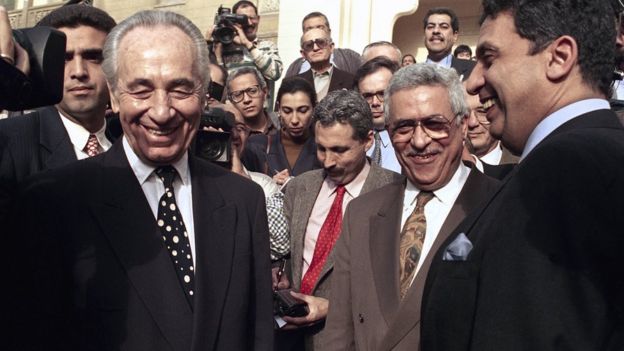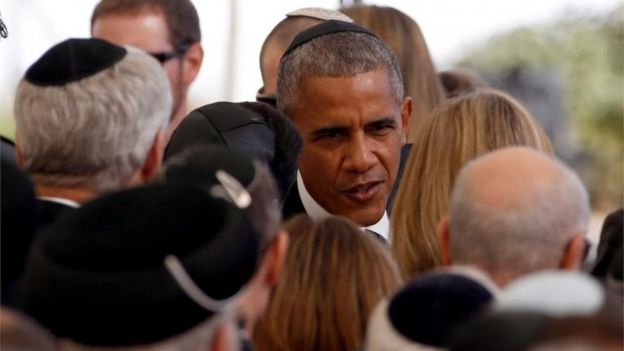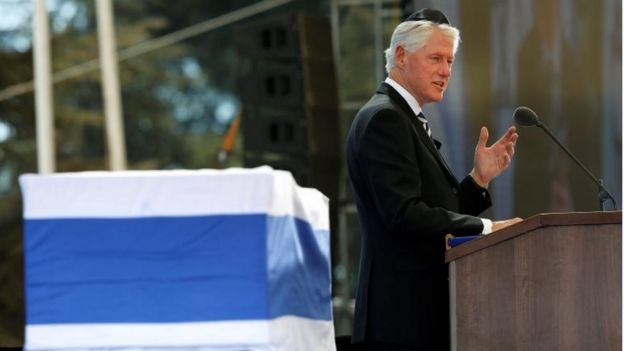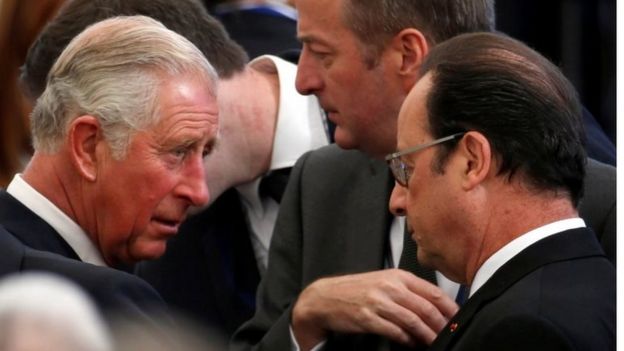
This article is more than
9 year oldIsraeli Prime Minister Benjamin Netanyahu described him as "a great man of the world", as he led the eulogies.
US President Barack Obama said the presence of Palestinian leader Mahmoud Abbas at the funeral was a reminder of the "unfinished business of peace".
Mr Abbas was among dozens of foreign dignitaries attending in Jerusalem.
Security was intensified ahead of the ceremony, with several people arrested.
Delivering an emotional address, Mr Netanyahu said that while Israel and the world grieved for Mr Peres there was hope in his legacy.
"Shimon lived a life of purpose," he told thousands gathered at Jerusalem's Mount Herzl cemetery.
"He soared to incredible heights. He swept so many with his vision and his hope. He was a great man of Israel.
"He was a great man of the world."
Former US President Bill Clinton, who helped negotiate the Oslo peace accords between Israel and the Palestinians in the 1990s, said he was Israel's "biggest dreamer".
"He imagined all the things the rest of us could do. He started life as Israel's brightest student, became its best teacher and ended up its biggest dreamer.''
US President Barack Obama closed the eulogies, comparing Mr Peres to "some of the other giants of the 20th Century that I've had the honour to meet, like Nelson Mandela and Her Majesty Queen Elizabeth".
Mr Peres, he said, believed in equality for Palestinians.
"Even in the face of terrorist attacks, even after repeated disappointments at the negotiation table, he insisted that as human beings Palestinians must be seen as equal in dignity to Jews and must therefore be equal in self determination."
On Mount Herzl where evergreen trees shaded the dusty walkways from the late-summer sunshine, an extraordinary congregation assembled to say goodbye to Shimon Peres.
You could have worked out that it was his funeral from the guest list alone - Prince Charles and Barack Obama, Israeli PM Benjamin Netanyahu and Palestinian leader Mahmoud Abbas. It's hard to imagine any other leader being mourned in quite the same way.
Israel said goodbye to the last of its founding generation and global diplomacy mourned a lost star, but the children of Shimon Peres grieved a father and spoke of him with elegance and simplicity.
And Mr Peres remained in command to the end, choosing his own funeral music. It was a setting of an old prayer he remembered his grandfather singing to him in the pre-war Poland of the 1920s.
Elegant and mournful, it played at the end of the old president's long journey, as it had played at the start.
Mixed reaction to Peres' legacy in world media
Long legacy of Israel's elder statesman
Obituary: Shimon Peres, Israeli founding father
Before the ceremony began, Mr Abbas was seen shaking hands and speaking briefly with Mr Netanyahu. The last substantial public meeting between the two leaders was in 2010, with peace efforts completely suspended since April 2014.
Hamas, the hardline Palestinian group that runs Gaza, condemned Mr Abbas's decision to attend the ceremony.
Jordan and Egypt - the only two Arab countries to have signed peace deals with Israel - both sent official representatives to the ceremony.
Mr Abbas, along with Mr Peres, was one of those who signed the Oslo peace accords in 1993, in the presence of Yasser Arafat and Yitzhak Rabin.
Mr Peres, Mr Rabin and Mr Arafat were jointly awarded the Nobel Peace Prize in 1994 "for their efforts to create peace in the Middle East". All three have now died.

Mr Peres' reputation in the region is complicated by the 1996 shelling of Qana in southern Lebanon that killed more than 100 people sheltering in a UN compound.
It took place when, as prime minister, he ordered an offensive against a wave of rocket fire by the militant Hezbollah movement.
He later said it was a "bitter surprise" to find that several hundred people were in the camp at the time.



The funeral was the largest such event in Israel since the funeral of Prime Minister Yitzhak Rabin, who was assassinated by a Jewish nationalist in 1995.
Mr Peres suffered a stroke two weeks ago and died on Wednesday in a hospital near Tel Aviv.